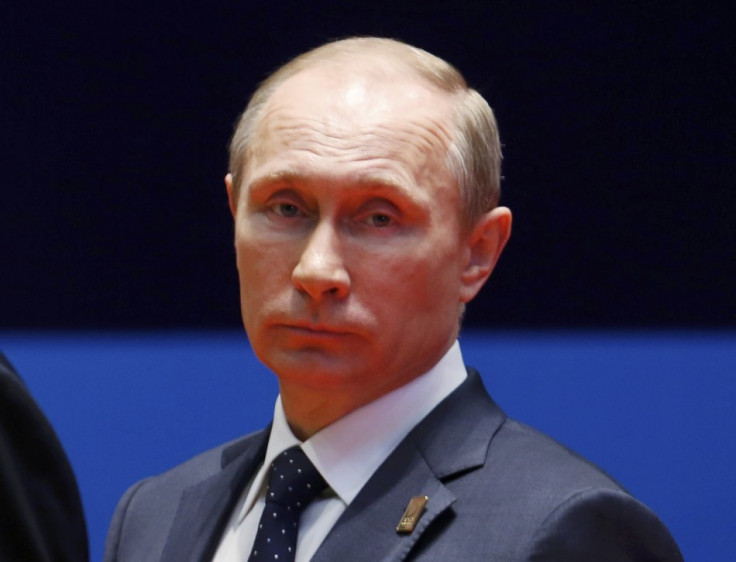Will Russia Actually Turn off the Gas?

It was bound to happen. In the month since Russia annexed Crimea, the diplomatic squabbling has got persistently louder and louder. Washington barks, Moscow snarls, Kiev holds its breath and hopes it doesn't get bitten again.
The theatre has been exemplary. Western sanctions on Russian bogeymen. Reports of allegedly sober, well-equipped Russian soldiers amassing on Ukraine's borders. Eventually, the geopolitical spat took an inevitable turn when Russia slapped the nascent Ukrainian government with a massive price hike. Almost doubled it in a week. Ukraine scoffed and refused to pay such a "political price".
So here we are, the moment we all knew was coming – Russia threatening to turn off the gas. Just Ukraine's gas, mind, not Europe's gas, but as we've all learned, Europe relies on Ukrainian pipelines to transport the gas it buys from Russia.
But will the Russians actually do it?
There are precedents. Kiev winters in 2005 and 2008 were made even colder as Moscow cut off gas supplies to its neighbour.
In 2005 it was all about prices – Ukraine enjoyed a hefty discount from the Russian state gas company Gazprom, which it passed on to consumers. Moscow didn't like the look of the pro-European Orange government in Ukraine and upped the price. Sounds familiar, right?
Eventually, a lot of men in suits sat down and worked out a new price that Ukraine should pay for its gas. And the gas was turned back on.
The gas supply to Ukraine stopped for three days while the sides worked out a deal. European supplies were hit but the public didn't notice it.
In 2008, it was all about prices – Gazprom wanted more for the gas and it wanted Kiev to pay a huge amount in outstanding gas payments. Sounds familiar again? This time, it got nastier. Gazprom halted all natural gas exports to Ukraine but continued exports to Europe. When Moscow got wind that Ukraine was siphoning off some of the gas that was meant for European countries, it was so cross that it stopped all transfers of gas through Ukraine.
This went on for more than a week and a number of European nations reported dwindling supplies. Eventually, a lot of men in suits sat down and worked out a new price that Ukraine should pay for its gas. And the gas was turned back on.
While the faces on the Ukrainian side of the crisis have changed, the dynamic is almost the same. Vladimir Putin doesn't like the look of a pro-European government in Kiev and he wants to let them know by cutting the cushy subsidy on gas.
He's done it twice before, so why wouldn't he do it again?
Prof Michael Bradshaw, an expert in the Russian gas and oil industry and European energy security at Warwick Business School, thinks that Russia's got too much to lose.
"Gazprom and the Russian government can ill afford the long-term loss of market share and the associated revenues from gas sales to Europe that would follow shutting off gas supplies to Ukraine," he said in a statement.
"The EU is looking to find alternatives to Russian gas, which will mean Gazprom will lose market share in Europe and its fortunes will then depend on what happens in the domestic market, and its attempts to find new customers in Asia, with Putin travelling next month to China in an attempt to sign a long-term gas agreement with China.
"If that fails to materialise, then Gazprom will face the prospect of falling sales in Europe, while failing to create new opportunities in Asia."
Europe and Ukraine are a big market and source of profits for the Russian gas company. But a deal with China looks similar: big market and big profits to be made.
However, the Chinese have proved dogged negotiators and are holding out for a lower price than the Russians are willing to offer. With the ongoing crisis in Ukraine, Beijing seems to have the upper hand ahead of Putin's visit.
But the Russians have also shown tenacity in negotiations and it really is anyone's guess what comes out of the May meeting.
As for Europe, it is tied to Russian gas. For all the talk across the continent about sourcing alternative supplies, unless there's a sudden pan-European embrace of fracking, the reliance on Russia will remain.
Beneath the layers of rhetoric lies the fact that Russia has something that Ukraine and Europe need in the short term. Moscow's done it before. Putin's done it before. It shouldn't come as a shock if he does it again.
© Copyright IBTimes 2025. All rights reserved.






















